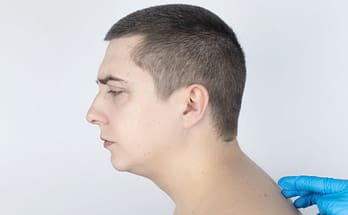I’m sure you’ve heard that sleeping with a pillow can cause neck pain or headaches. This is because pillows can push your head forward and put additional stress on the muscles and ligaments in your neck. But do you know why this happens? And what exactly does sleeping without a pillow mean?
In this article, we’ll discuss why sleeping with a pillow helps your body and what happens when you don’t use one.
Symptoms of forward head posture
There are a number of symptoms that can indicate you have forward head posture.
Neck pain is one of the most common symptoms associated with forward head posture, but there are many others.
Other common symptoms include headaches, shoulder pain, upper back pain, and general fatigue.
The longer you have a forward head posture problem, the more likely it is that these symptoms will continue to get worse.
If you do experience any of these symptoms on a regular basis, consider seeing a chiropractor who can offer you some relief through adjustments or other methods such as massage therapy or acupuncture.
Causes of forward head posture
There are many different causes of forward head posture, but most fall into one of two categories: structural or functional.
Structural causes are usually related to genetics and can be inherited from your parents. Examples include certain anatomical features such as an elongated upper body and short legs.
Functional causes are more common and relate to how you use your body throughout the day.
This includes using a computer, holding a phone to your ear while talking, or doing other repetitive tasks.
The more you do these movements over time, the more likely you are to develop forward head posture.
Possible benefits of sleeping without a pillow
You may have heard that sleeping without a pillow is better for your health. But, is it really?
There are many benefits of sleeping without a pillow, but it is not a good idea for everyone.
Sleeping without a pillow can prevent or reduce back and neck pain, it may help your body rest better. However, maybe it is because your old pillow is too soft or too firm or too high for you.
It simply means no pillow is better than a bad pillow.
Wrinkles
Studies have shown that pillows can compress the skin during sleep, particularly in people who sleep on their stomach or their side. This can lead to wrinkles and contribute to the visible signs of aging.
Sleeping without a pillow can stop the face from scrunching up , but sleeping on the side or back can contribute to spinal problems.
Try other options to reduce wrinkles such as: avoiding sun exposure , eating a healthful diet , moisturizing daily , and avoiding stress.
Acne
Some people report that sleeping without a pillow can help with acne, while others claim it has no effect.
Pillows can contribute to acne because they trap dead skin cells and bacteria that lead to breakouts, and acne is caused by those tiny particles getting into your pores and clogging them.
Sleeping without a pillow can help prevent this by allowing the face to breathe and preventing oil from building up on your skin.
Keeping your sheets and pillowcases clean and free from germs is always a good idea rather than sleeping without a pillow if you have forward head posture.
Allergies
Allergies are another common reason for people to avoid sleeping on pillows. If your pillow is stuffed with feathers, dust mites and other allergens can easily get into your body and make it react. This is especially true if you have asthma or eczema. Besides, a pillow that isn’t cleaned regularly may contain bacteria from your skin or hair follicles which can trigger allergies as well.
Again, Keeping your sheets and pillowcases clean might be netter than sleeping without a pillow if you are suffering from forward head posture.
MedicalNewsToday
Do pillows cause forward head posture?
While we’re on the subject of pillows, it is important to note that they do not cause forward head posture.
This is a common misconception among people who don’t understand how the body works.
The only way a pillow can cause forward head posture is if you use one that is too soft or too high and causes your neck muscles to relax too much or push your head forward while sleeping.
Impacts of the pillow on forward head posture
The pillow itself can cause forward head posture if it is too soft or too high.
A pillow that is too soft will not provide proper support for your neck while you sleep, which means that the muscles in your neck will have to work harder to hold up your head. This can result in pain and stiffness when waking up in the morning.
A pillow that is too high will also cause you to have forward head posture. A pillow that is too high will put too much strain on your neck muscles, causing them to relax and allow your head to fall forward while sleeping.
How should I sleep to improve forward head posture?
If you have forward head posture, it is important that you make some changes to your sleeping position.
The first step is to get a new pillow that supports your neck properly. You should choose a pillow that is soft enough for comfort but firm enough so it won’t flatten out as you sleep on it.
The second step is to find a new sleeping position. You should try to sleep on your side or stomach with a pillow between your knees, if sleeping on your back is causing pain and discomfort.
This will prevent your head from falling forward while you sleep.
You can also try sleeping on your back with a pillow under your knees. This will help keep your spine in proper alignment as you sleep. If you’re still experiencing pain and discomfort after making these changes, talk to your doctor about the possibility of wearing a neck brace while sleeping.
healthline
So, still thinking about sleeping without a pillow for your FHP?
The right pillow can help maintain proper alignment of your spine while you sleep, providing you with comfort and support.
If you’re used to sleeping on your back, you might find that sleeping on your side is more comfortable.
Pillows can also be adjusted for firmness, size and shape. Try various types until you find one that works for you.
If you still experience discomfort, talk to your doctor about the possibility of wearing a neck brace while sleeping.
No pillow may be better than a bad pillow, but almost always the right pillow is better than no pillow.




